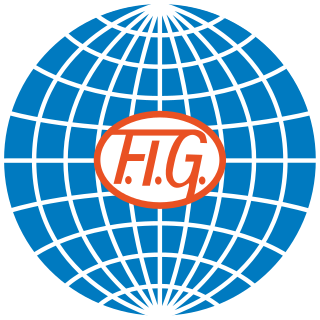
The Fédération Internationale de Gymnastique is the governing body of competitive gymnastics. Its headquarters is in Lausanne, Switzerland. It was founded on July 23, 1881, in Liège, Belgium, making it the world's oldest existing international sports organisation. Originally called the European Federation of Gymnastics, it had three member countries—Belgium, France and the Netherlands—until 1921, when non-European countries were admitted and it received its current name.
XXVII World Rhythmic Gymnastics Championships were held in Baku the capital of Azerbaijan, 3–10 October 2005 at the Heydar Aliyev Sports and Exhibition Complex.
The Rhythmic Gymnastics World Championships are the world championships for the sport of rhythmic gymnastics. The tournament is promoted and organized by the Fédération Internationale de Gymnastique (FIG). It is one of the three tournaments in rhythmic gymnastics officially organized by FIG, as well as the Rhythmic Gymnastics World Cup and the gymnastics competitions at the Olympic Games. The first edition of the World Championships was held in 1963, a time when the sport was known as modern gymnastics. The current program of the World Championships contemplates both individual and group performances. In even non-Olympic years and the year before the Olympics, a team event is also contested. Two events are not competed at the World Championships anymore: individual rope and free hands.
The Artistic Gymnastics World Championships are the world championships for artistic gymnastics governed by the Fédération Internationale de Gymnastique (FIG). The first edition of the championships was held in 1903, exclusively for male gymnasts. Since the tenth edition of the tournament, in 1934, women's events are held together with men's events. As of 2017, over sixty different editions of the championships have been staged, and over forty different countries have earned medals in both men's and women's artistic gymnastics events. The most successful nation, both in gold medal results and total number of medals, is Soviet Union. China is the second most successful country in total medals earned, and Japan is the third most successful nation at the championships. Russia, Romania and the United States are also usually among the most dominant nations, especially in women's artistic gymnastics events. Currently, the championships is held annually in non-Olympic years, and all (individual) events are held in every championships but with the omission the team all-around event in the year following an Olympic year.
The Trampoline Gymnastics World Championships are the world championships for trampoline gymnastics. They were originally held annually from 1964–1968. The frequency was switched to biennially from 1970–1998. The admission of trampolining to the Olympic Games required a switch to holding the World Championship as a qualifier in the year before the Olympics from 1999.
The men's floor exercise competition at the Artistic Gymnastics World Championships was first contested in 1930. It has been held in every year since its inception.
The men's pommel horse competition was an inaugural event at the Artistic Gymnastics World Championships. It was not held in 1909.
The men's still rings competition was an inaugural event at the Artistic Gymnastics World Championships. It was not held in 1905 and 1907.
The men's vault competition at the Artistic Gymnastics World Championships was first contested in 1934. It has been held in every year since its inception.
The Rhythmic Gymnastics World Cup is a competition for rhythmic gymnastics sanctioned by the Fédération Internationale de Gymnastique (FIG). It is one of the few tournaments in rhythmic gymnastics officially organized by FIG, as well as the World Championships, the gymnastics competitions at the Olympic Games and the Youth Olympics and the rhythmic gymnastics events at the World Games. The World Cup series should not be confused with the Rhythmic Gymnastics Grand Prix Series, which is neither officially organized nor promoted by FIG.
The FIG World Rankings is a system determining a list of the World's best gymnasts competing on the Artistic Gymnastics World Cup. A separate World ranking system is also used for Rhythmic Gymnastics.
These are two lists of achievements in major international gymnastics events according to first-place, second-place and third-place results obtained by gymnasts representing different nations. The objective is not to create two combined medal tables; the focus is on listing the best positions achieved by gymnasts in major international competitions, ranking the nations according to the most number of podiums accomplished by gymnasts of these nations. All seven competitive disciplines currently recognized by the International Gymnastics Federation (FIG) are covered: 1) acrobatic gymnastics, 2) aerobic gymnastics, 3) men's artistic gymnastics, 4) women's artistic gymnastics, 5) women's rhythmic gymnastics, 6) trampoline and tumbling, and 7) parkour.
The 2015 Rhythmic Gymnastics World Championships, the 34rd edition, was held in Stuttgart, Germany, from September 7 to 13, 2015 at the Porsche Arena.

The 2017 Artistic Gymnastics World Championships was the forty-seventh edition of the Artistic Gymnastics World Championships. The competition was held from October 2–8, 2017, at the Olympic Stadium in Montreal, Quebec, Canada.
FIG World Cup refers to a number of events organized by the International Gymnastics Federation (FIG) across seven competitive gymnastics disciplines: 1) acrobatic gymnastics, 2) aerobic gymnastics, 3) men's artistic gymnastics, 4) women's artistic gymnastics, 5) women's rhythmic gymnastics, 6) trampoline and tumbling, and 7) parkour.

The 2017 Rhythmic Gymnastics World Championships, the 35rd edition, was held in Pesaro, Italy, from 30 August to 3 September 2017.
The 32nd Trampoline Gymnastics World Championships were held in Sofia, Bulgaria, from November 9–12, 2017.

The 2018 Artistic Gymnastics World Championships was the 48th edition of the Artistic Gymnastics World Championships. The competition was held from October 25 – November 3, 2018, at the Aspire Academy Dome in Doha, Qatar.
The 2018 Acrobatic Gymnastics World Championships was the 26th edition of acrobatic gymnastics competition and took place in Lotto Arena, Antwerp, Belgium from April 13 to April 15, 2018.
The 15th Aerobic Gymnastics World Championships took place in Guimarães, Portugal from June 1 to 3, 2018. The 8th World Age Group Competitions were held at the same place between May 25 and 27.





